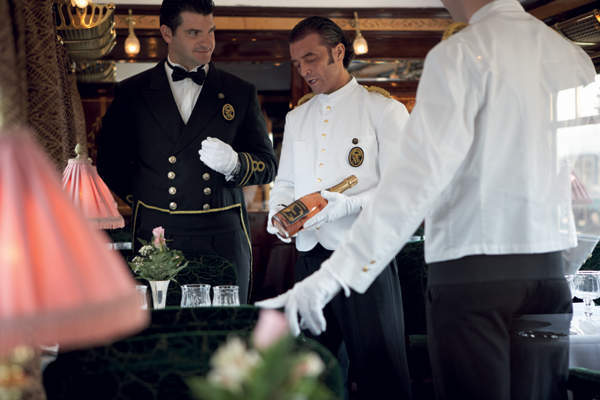

At a time when the UK is considering a break from Europe, it’s nice to see that there are still some things that unite us – like Belmond’s signature pan-European journey taking us through Italy, Austria, Switzerland, Liechtenstein, France and finally a channel crossing and two hours onboard the Orient Express’s sister train – the British Pullman – from the Kentish Coast to London Victoria. Next year, for the first time, the train will pull into Berlin – a city it has avoided for a century.
‘Keeping with the spirit of the occassion, you can never be overdressed,’ says the handout. Needless to say, jeans and the like are not allowed.
Arriving by boat for our 11.01 departure from Santa Lucia station in Venice (after two nights at the Cipriani, and a tour of the floating city’s hidden vineyards), I boarded the fabled train and headed back to the 1920s for the 24 hour journey to London.
Kitted out with plush seating, original 1930s furnishings and a wash-area (there are no showers or baths on board – or WiFi, I should add), our charming maitre’d guides us around our compact, cosy private cabin and its amenities, littered with luxury trinkets. There are lots of nice little touches, like a hand-written bon voyage from the general manager. ‘The first Orient Express travelers were fascinated by a new luxury product at that time: soap in the washbasins,’ reads an inlay.

A half-mile in length, it takes me at least twenty minutes to explore the cobalt train’s polished wood-paneled interior. The staff, dressed in electric blue from head to toe, greet and spoil us warmly as we move from section to section, setting off across the sun-baked Veneto from Venice to Verona, snaking deep into the Dolomites past ancient citadels perched precariously on sheer limestone cliffs. Everyone kicks back for a bit, absorbing the rolling scenery in our novel privacy.
Hours in, crossing into Austria under a deep blue afternoon sky, we stop to take in the snow-capped peaks of Innsbruck that ring the alpine station. The sight is all too much for one fellow passenger, who jumps down onto the tracks to capture the moment on camera.
‘You know what’s special about this train? There is only one in the world. Everyone feels special, from famous jet-setters to the staff. Hotels, there are millions. But this there is only one,’ Pascal Deyroule, the general manager, tells me as we cross into Switzerland in one of the train’s ornate dining cars. We thread a tunneled mountainside, daylight fading under the shadows of the Alps.

Deyroule, a debonair former French army sergeant, tells me how two World Wars scattered the original carriages from France to Istanbul (the 1918 armistice was signed aboard one and later blown up by retreating Nazis). The Cold War only complicated matters further. While other services continued to use the Orient Express name – including the original route to the Bosphorous via Belgrade, stocked by pedestrian carriages, Agatha Christie’s Express was no more.
Then in 1977, James Sherwood, Belmond’s founder, bought two dilapidated pre-War, engineless first-class sleeper cars at auction (a year before, he had bought the Hotel Cipriani – then a loss-maker – for less than £1 million). Five years and 23 discoveries later, the American entrepreneur launched the Venice-Simplon Orient Express.
The original was born a hundred years prior when Belgian engineer George Nagelmackers, inspired by the technically superior (though slightly less luxurious) Pullman trains of America, founded La Compagnie Internationale des Wagons-Lits.
Departing Gare de l’Est station in Paris on its inaugural journey in 1883, the world’s first, true luxury long-distance train took passengers 3,000km to Constantinople via Strasbourg, Munich, Vienna, Budapest, Bucharest and Giurgiu, Romania. There, contrary to the popular belief that the train carried them all the way, they crossed the Danube by ferry, boarding another train across Bulgaria to the Black Sea before boarding a steam-boat for the seventeen-hour journey to Constantinople.
The train’s cars – seven of which are historic French monuments – are refurbished once a year at some £4000 per square foot, Deyroule tells me – only due to the vibrations, as we pass through the exotic, black lacquer decorations of the ‘L’Oriental’ car. But the framing – and much of the furnishings – are original, minus the velour, brass fittings and some of the marquetry which adorns its length.
I’m shown the piece de la resistance – the ‘Cote d’Azure’ car. The 34-seater is rumoured to have made its name as Coco Chanel’s ride from Paris to Cannes, replete with striking Lalique glass, Cuban mahogany and plush, ocean-blue interior, lined with fine linen, antique silver, monogrammed bone china and rose lampshades.
The car is also host to the train’s new champagne bar – in which we were its inaugural guests. It’s an ambition that’s been on Deyroule’s mind for over 25 years – reaching back to his days as a cabin steward: ‘I’m very fortunate – my kids have been brought up in hotels around the world… but what they remember of all the different places is all the special moments, like going under the water at Iguazu falls. They don’t remember the five star hotel,’ he says, as we tuck into a batch of truffle-infused quail eggs and a Guilty 12 – the Express’s signature cocktail.
‘What they remember is the special cave in Laos with 1000 Buddhas… all those little things. And for me, the celebration breakfast and the champagne bar was kind of capturing the essence of what we do, of what Belmond does, what the train does. Because on the luxury market, it’s always nice rooms, nice meal, you have a nice decor. But what we do is just little snapshots of memories, where you say, yes – that was a great moment. And that’s all it is – that’s all it is.’
The staff certainly seem unperturbed by the routine. Happy and impeccably courteous, many of them have been on the train for 30 years – not least its head chef, Christian Bodiguel, denied his Michelin star due to the arbiter’s rules on static placement. Peering into the narrow chrome kitchen where he cooks day and night it’s clear the Express engenders devotion (it’s said that King Edward VII tried to persuade an Orient Express chef to work for him, only to be declined).

Approaching dinner, the scene in the bar car is a straight lift from the 1920s. Bathed in a warm, red glow, dapper passengers recline on the sofas chatting and relishing the moment as the chords of a baby grand piano fill the air. We dig into red mullet and sea bass, slowly braised fennel fondue. Succulent, herb-crusted lamb falls from the bone and melts marvelously into the sumptuous, crunchy chorizo petal and sweet red peppers with bulgur filling.
A few hours and cocktails later, made by Colin Field – resident guru the Ritz Paris’ Hemmingway Bar – the best barman in the world according to Forbes, we return to our cabins to find the plush seating transformed into a bed by the maitre’d as we cross Switzerland through the night, passing the faint light of towns and cities sparkling in the distance.
Sleeping onboard, we’re warned, is a love-it or hate-it experience. I loved it. Rocked by the train’s gentle rhythm, I couldn’t have been happier. But waking up in Paris Gare du Nord, surrounded by curious, fluorescent linesmen was a little surreal. It’s tantalising to pass through a city like Paris inside a cocoon, but I realize, that’s half the fun. This was about the journey.
Continental breakfast is delivered to our cabins while the chef disembarks to inspect live lobsters from Brittany, tomatoes from Provence and saltmarsh lamb from Mont St Michel. None of the food is standard train fare, of course: a la carte options include Imperial Beluga Caviar (at €490 per head) or the more modest Kaspia variety served with blinis and melted butter or sour cream, hard-boiled egg and shallots at €280 (the train works its way through 120 kilos a year, I’m told).
Keep a keen eye on the drinks tab, though: one unsuspecting passenger came to query a €150 bill, which turned out to have been for half a shot of brandy (a 1967 variety, I believe). This is probably easier said than done in the legendary piano bar: legend has it that its stalwart barmen only go to bed after its last guest has done the same. Though, I’m told, on a very, very late night, they have retired, leaving a bottle on the bar.

We roll on from Paris, and an hour later the sun is high as we chug towards the coast through golden fields over sumptuous broiled lobster with potato and chive whirls. Before long it’s time to say goodbye to the Express and say hello to the ‘luxury’ coach that would take us from Calais, piggybacking on another train across the Channel. (It’s the same coach that carries Manchester United and Chelsea, we’re told – questionable reassurance perhaps, but thankfully, our roundtable at the back was more than okay).
After a night on the Express, the half-hour journey felt like five minutes. We emerged in Kent for the drive to Folkestone. There, a local brass band welcomed us aboard the British Pullman – the Express’s sister train. Steeped in history itself (its carriages once carried Charles de Gaulle and formed Winston Churchill’s funeral train), we settled in for the two-hour transfer to London Victoria, sustained by more tea and cake than we could eat.
As a London commuter accustomed to the daily ineptitudes and exorbitance of Thameslink , I must admit I wasn’t sure how I’d feel after two full days and a night on a train. But pulling into Victoria on the Pullman, I was ready to get back on again. Berlin, here we come.
Prices for a two night stay at Belmond Hotel Cipriani in a Double Garden View Room and a two day/one night journey from Venice to London on the Venice Simplon-Orient-Express in a Double Cabin start from £2,905 per person. Price includes transfers, table d’hotel meals and a walking tour of Venice, based on travel in October 2015.
To book or for more information visit Belmond or call 0845 077 2222








